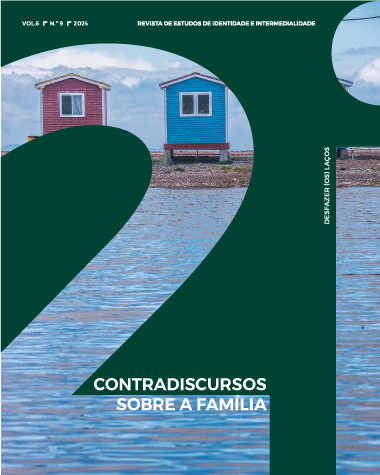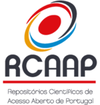Mother of the Freaks
Mothering, family, and community in Camila Sosa Villada's 'Las Malas'
DOI:
https://doi.org/10.21814/2i.5601Keywords:
travesti, family, adoption, heteronormativityAbstract
hile analysing Las malas (2019) by Camila Sosa Villada, this article looks at the family and its intersection within travesti identities and bodies. By portraying a group of travesti sex workers, Sosa Villada proposes alternative ways of constituting a family by questioning the patriarchal heteronormative structure, a structure marked by sexism, violence, homo and transphobia, and how the travesti community transforms the notion of family by making sisters and mothers out of friends and by adopting an abandoned baby. This adoption, an alternative proposal to heterosexual conception, proves to be the biggest obstacle for this community, apart from violence, prejudice, illness and premature death, given that, for the society that surrounds them, the idea of a travesti adopting a child is inconceivable. Las malas offers groundbreaking ways of creating bonds of affection and kinship beyond the structures defined by blood and the law, while also questioning notions of inheritance and genealogy, suggesting that it is through bonds that exist outside the family that feelings of belonging, sharing, and material and emotional security are experienced, especially when the blood family presents itself as a source of trauma and rejection.
Downloads
References
Ahmed, S. (2014). The cultural politics of emotion. Edinburgh University Press.
Billard, H. (2022). La representación de las prácticas queer y la resignificación de la noción de familia en dos novelas argentinas recientes: Soy lo que quieras llamarme y Las malas. Whatever: A transdisciplinary journal of queer theories and studies, 5, pp.209-222.
Bradway, T. & Freeman, E. (2022) Introduction. In Bradway T. & Freeman E. (Eds.) Queer kinship: race, sex, belonging, form. (pp. 1-25). Duke University Press.
Butler, J. (2002) Is kinship always already heterosexual?. differences, 13 (1): 14–44. https://doi.org/10.1215/10407391-13-1-14
Gallego Cuiñas, A. (2022). Contra el canon: la narrativa de vanguardia de Camila Sosa Villada. Revista Telar. ISSN 1668-3633, (29), 69-88.
Galligo Wetzel, A. (2020) Formas de la aparición en Las malas de Camila Sosa Villada; Universidade Federal de Santa Catarina. Núcleo Onetti de estudos latino-americanos; Landa; 8; 2; 6-2020; 51-78.
Gamba, A. M. (2023). El barroco maravilloso de Las malas: nuevas aproximaciones a la tradición desde la literatura del presente. Caracol, 25, 235-263. https://doi.org/10.11606/issn.2317-9651.i25p235-263
Halberstam, J. (2007) Forgetting family: queer alternatives to Oedipal relations. In Haggerty, G. E. & McGarry, M. (Eds.) A companion to lesbian, gay, bisexual, transgender, and queer studies. (pp. 315-324) Blackwell.
_____ (2005). In a queer time and place: Transgender bodies, subcultural lives. New York University Press.
Medeiros, R. F. (2021). Sejamos cúmplices da construção de possíveis futuros: Travesti – una teoría lo suficientemente buena. Revista brasileira de literatura comparada, 23 (44). 253-253. https://doi.org/10.1590/2596-304x20212344rfm
Mochkofsky, G. (2022, March 23). A novel and the fight for transgender rights in Argentina. The New Yorker. https://www.newyorker.com/news/daily-comment/a-novel-and-the-fight-for-transgender-rights-in-argentina
Moszczyńska-Dürst, K. . (2021). Entre la crisis de lo "humano", la autoficción trans(fuga) y el "arte queer del fracaso": Las malas de Camila Sosa Villada . Pasavento: Revista de estudios hispánicos, 9(2), 309-322. https://doi.org/10.37536/preh.2021.9.2.1058
Moya, M. (2023). “La casa de la compasión”: apuntes sobre lo fantástico, la tradición y el mundo trans en un cuento de Camila Sosa Villada. Caracol, 25, 264-295. https://doi.org/10.11606/issn.2317-9651.i25p264-295
O’Reilly, A. (2020). Maternal theory: Patriarchal motherhood and empowered mothering. In Hallstein, L. O., O’Reilly, A. & Giles, M. V. (Eds.). The Routledge companion to motherhood. Routledge.
Osores, I. S. (2021). Desencantos y maravillas: comunidad, fracaso y utopía queer en Las malas de Camila Sosa Villada. Chasqui, 50(1), 133–152. https://www.jstor.org/stable/27120877
Park, S. M. (2020). Queering and querying motherhood. In Hallstein, L. O., O’Reilly, A. & Giles, M. V. (Eds.). The Routledge companion to motherhood. Routledge.
Pierce, J. (2020). I monster: Embodying trans and travesti resistance in Latin America. Latin American research review, 55(2), 305-321. https://doi.org/10.25222/larr.563
Rich, A. (1976). Of woman born: Motherhood as experience and institution. W. W. Norton.
Rizki, C. (2020a). Familiar grammars of loss and belonging: curating trans kinship in post-dictatorship Argentina. Journal of visual culture, 19(2), 197-211. https://doi.org/10.1177/1470412920941905
_____ (2019) Latin/x American trans studies: Toward a travesti-trans analytic. TSQ. 6 (2), 145–155. https://doi.org/10.1215/23289252-7348426
_____ (2020b). “No state apparatus goes to bed genocidal then wakes up democratic”: Fascist ideology and transgender politics in post-dictatorship Argentina. Radical history review 1 October 2020; 2020 (138): 82–107. doi: https://doi.org/10.1215/01636545-8359271
Rose, M. M. (2019). Giuseppe Campuzano's afterlife: toward a travesti methodology for critique, care, and radical resistance. TSQ. 6 (2): 239–253. https://doi.org/10.1215/23289252-7348524
Ruddick, S. (1989). Maternal thinking: Toward a politics of peace. Beacon Press.
Simonetto, P., & Butierrez, M. (2023). The archival riot: Travesti/trans* audiovisual memory politics in twenty-first-century Argentina. Memory studies, 16(2), 280-295. https://doi.org/10.1177/17506980211073099
Sosa, C. (2011). Queering acts of mourning in the aftermath of Argentina’s dictatorship: The mothers of Plaza de Mayo and Los rubios. In F. Lessa & V. Druliolle (Eds), The memory of state terrorism in the Southern Cone. (pp. 63-85). Palgrave Macmillan.
Sosa, L. (2020). Now you see me? The visibility of trans and travesti experiences in criminal procedures. Politics and governance, 8(3), 266-277.
Sosa VilladaVillada, C. (2022). Bad girls (Kit Maude, Trans.). New York: Other Press.
Venturini X. (2023). Autobiografía y cruce en Las malas de Camila Sosa Villada. Anales de literatura hspanoamericana, 51, 221-232. https://doi.org/10.5209/alhi.85136
Downloads
Published
How to Cite
Issue
Section
License
Copyright (c) 2024 Ana Bessa Carvalho

This work is licensed under a Creative Commons Attribution-NonCommercial 4.0 International License.


.jpg)










